Parents of children with disabilities face tough choices while coping with COVID
Schools are closed but Israel decided to keep special education programs running. Now parents are faced with the choice: Routine or risk?
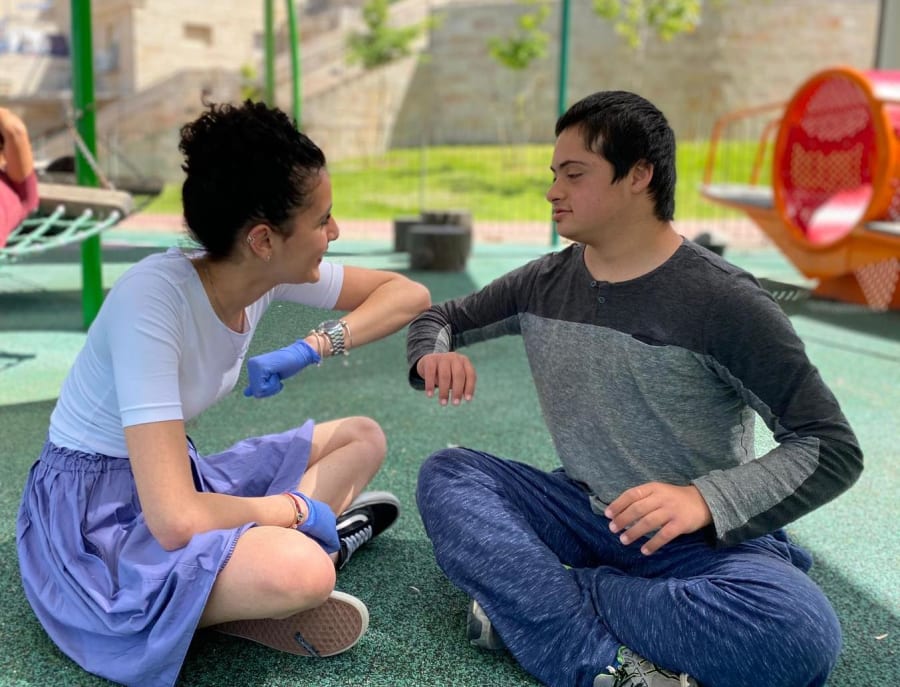
Israel’s controversial second national lockdown shut the education system three weeks ago sending 4 million Israeli students to study from home as distance learning was put in place until further notice.
But no less controversial was the decision to allow special education programs to remain open during this same period.
Proponents argue that children with disabilities regress without a framework and therapies, and that their families are hard pressed to provide the same level of professional input at home. Others point out that neither these children — nor their teachers and therapists — are immune to the contagious coronavirus and should be at home like everyone else.
It’s a sticky issue for lawmakers and parents alike.
The current lockdown began on Sept. 18 and was meant to get a handle on Israel’s morbidity rate of skyrocketing COVID-19 infections, which have resulted in more than 200,000 cases and 1,800 deaths since March.
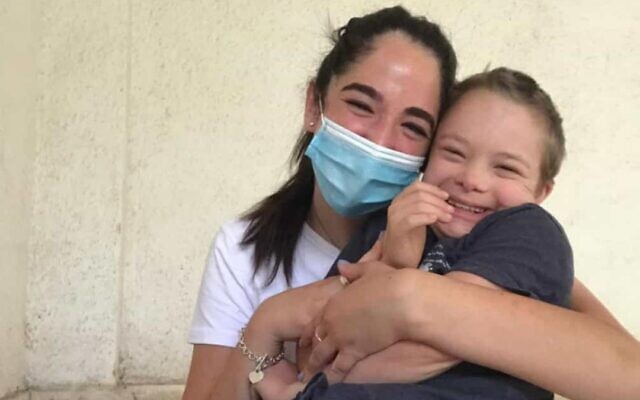 Shalva has adapted to the Health Ministry's new coronavirus rules (Photo: Shalva)
Shalva has adapted to the Health Ministry's new coronavirus rules (Photo: Shalva)Education Minister Yoav Galant explained why special education classes, youth villages and programs for at-risk youth would continue to operate during the lockdown.
“Special education is important and central, and you need to take an increased risk in order to take care of those children and we will do the best we can,” Gallant said. “With all due respect to the teaching staff, the children need daily therapies.”
The teachers union, however, opposed the decision, noting that the welfare of its members is at stake. Yaffa Ben-David, head of the union, requested “with regret” that the special education sector be closed along with the rest of the education system.
“I have no doubt that closing special education is bound to cause a regression among some of the students, especially the low functioning ones,” Ben-David said. “However, we are talking about a matter of saving lives.”
Even parents of children with special needs are divided on what they should do. Some have opted to keep their children at home despite having the option to send them to their programs. Others took the risk.
Here are the stories of some organizations and parents dealing with COVID, quarantine and special needs:
Shalva
Shalva, a center in Jerusalem for children with special needs, is operating most of its programs despite the lockdown.
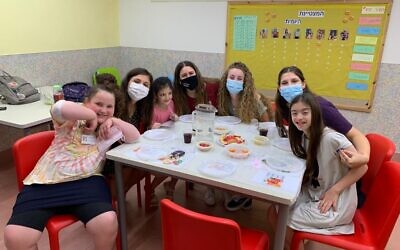 Shalva has adapted to the Health Ministry's new coronavirus restrictions. (Photo: Shalva)
Shalva has adapted to the Health Ministry's new coronavirus restrictions. (Photo: Shalva)“Children with disabilities and their families rely on in-person support services and therapies at Shalva,” said Kalman Samuels, founder and president of Shalva. “It helps them continue to progress in their rehabilitative development; and equally important, provides stability and peace of mind” to their parents.
Shalva means peace of mind in Hebrew.
Before the pandemic, Shalva was receiving some 2,000 children a week through its various programs for different age levels. After the first lockdown, from May through August, Shalva began a phased return to operations with some programs still temporarily suspended including sports, hydrotherapy and respite programs.
The numbers of participants now stands at about 720 children a week with as many programs and services open as possible in accordance with COVID health regulations.
“Shalva has made both organization-wide and program specific adaptations in order to operate according to COVID-19 health regulations," said Liat Rahat, director of Rehabilitative and Educational Programs. "Every department within Shalva is divided into capsules. We’ve made some very strategic policies that, despite being costly and challenging to enforce, have proven to be very successful. They allow for COVID incidents to remain isolated without compromising the operation of our other programs. This is so important because Shalva’s children and families really rely on our services. I hope we can continue staying open and being a support to them as much as possible this school year.”
Shutaf Inclusion Programs
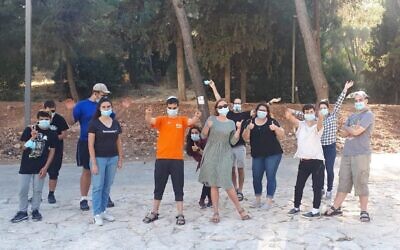 Shutaf is adjusting its programs during the pandemic (Photo: Facebook/Shutaf Inclusion Programs)
Shutaf is adjusting its programs during the pandemic (Photo: Facebook/Shutaf Inclusion Programs)Co-founder and co-director of Shutaf Inclusion Programs in Jerusalem, Beth Steinberg, is also navigating a new path with her organization — and for her son, 23, who has Down syndrome.
Her first priority is health. Steinberg said people with disabilities tend to be immune-compromised and exposure to a a harmful virus can be just as dangerous as regression in isolation.
“Lots of people are struggling and, while our needs — as well as of our kids — are a concern, the health risks are real,” Steinberg said.
Steinberg suggests figuring out and then prioritizing what children need most and then finding a safe way to provide it: “Maybe a visiting set of therapists and teachers checking in and offering real help and advice, or national service volunteers helping out as well. There's much that could happen more safely, especially as this drags on.”
As for Shutaf — which runs year-round programs for teens and adults, as well as seasonal camps — Steinberg said, “we keep adapting.”
For the organization’s annual summer camp, Shutaf created “Camp in a Box” and sent a package of activities to all the children who otherwise would have shown up in person. Now, Shutaf is already thinking ahead for the Hanukkah camp.
For its ongoing programs for teens and 21+ the organization is trying to “balance the need for some gathering online with fun games and ideas to interest them offline.”
“The program staff, directed by Marci Tirschwell keeps rethinking the plan. And we make decisions based on the need to create certainty during a time of uncertainty,” she explained.
They also have to balance their ideas with budget — making it more complex.
“The challenge is also figuring out what can we afford to do in order to serve kids when parents don't have money to pay for much of anything,” Steinberg said.
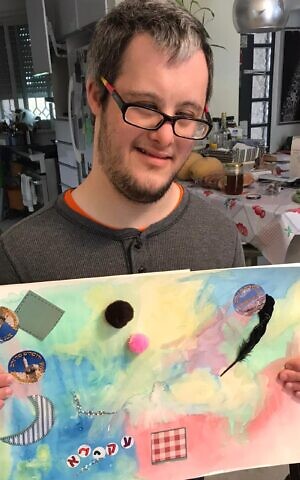 Akiva, 23
Akiva, 23“And yet kids are lonely and desperate for more than just school or Zoom. Online has its place but it must be planned for with great thought and sophistication.’”
Even on a personal level, Steinberg must constantly weigh the same risks-to-benefits ratio with her son, Akiva: send him to his programs and risk exposure to the virus versus a lonely, voluntary quarantine at home?
“Isolation was painful for us during the first lockdown and isn't easy again now,” she said.
Hallel, 10
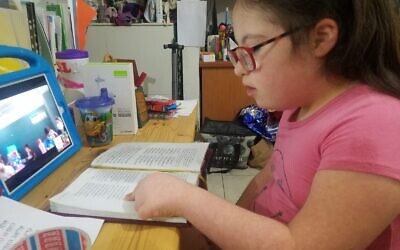 Hallel, 10
Hallel, 10Gaby Shine, whose 10-year-old daughter Hallel is mainstreamed in third grade, has kept her daughter isolated at home since the outbreak of the pandemic in March. She is concerned that Hallel’s combined health issues — borderline autoimmune liver disease, celiac disease, previous heart surgery and Down syndrome — put her in a high-risk category.
“Parents are sending kids to school because the risks involved in their not having structure, education, therapy, support and social interaction — and the risk to their parents’ sanity and finances — outweigh the corona risk,” said. “For us, we feel the risk to Hallel’s health is greater as she can manage somewhat on Zoom and has developed ways of being socially interactive on Zoom — and by meeting people outside in our garden with masks and distancing.”
But the decision has been costly in other ways. Shine points to the lack of physiotherapy as a problem and also grapples with the gamble of putting off medical appointments with specialists because of possible exposure to COVID in hospitals. And Hallel, Shine bemoans, has experienced some regression despite her family’s best efforts.
“She begs to go back to school and to Shalva every night before she goes to sleep. She says how much she misses her friends and her school and that she hates corona,” Shine said. “It is impossible to keep up with or modify the material for the more academic subjects on Zoom so she is falling way behind and off the scale, whereas she was really integrated into learning with the class before.”
Ephraim, 10
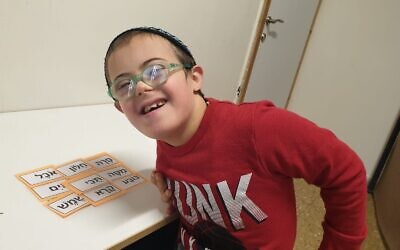 Ephraim, 10
Ephraim, 10Dassie Corman, who also has a 10-year-old with Down syndrome, weighed her options as well and decided to send Ephraim to his special education class in Jerusalem and his after-school program, as normal.
“I sent him for a few reasons: His class is small, meaning it’s a lower risk; he benefits from structure; he loves school,” Corman said. “And I don’t want him falling behind as it be harder for him to catch up in the future.”
Ephraim — who also has celiac disease and has undergone heart surgery — goes to school in the morning and heads to Shalva afterward every day. He gets transportation to and from home, school and Shalva.
“I don’t think COVID is going away,” Corman said explaining why she decided she would take the risk. “We will all have to make changes to deal with and then live with it.”
 Omar, 9
Omar, 9Omar, 9
Nada Sbeih grappled with whether her son Omar, 9, would be better off shielded at home or heading to school everyday. She tried both after the first lockdown ended in May — keeping him home at first and then sending him a few weeks after schools reopened. She didn’t skip a beat during this second shutdown.
“Omar learns much better when he’s at school. He has his daily routine he follows and enjoys,” she explained. “At home he knows he’s spoiled and chooses not to participate in anything educational wise.”
“I also understand when people choose not to send their kids because this virus is and can be deadly — each person reacts to it differently,” she said.
And while not everyone will take the risk, Sbeih decided her family would have to try and live with it.
“COVID-19 isn’t going anywhere anytime soon,” she said. “We have to learn how to live with it being out there now. We are taking precautions the best we can and doing whatever is needed to try and protect him the best we can. But the truth is, in reality, I believe everyone is going to get it sooner or later.”

Nicole Jansezian was the news editor and senior correspondent for ALL ISRAEL NEWS.














